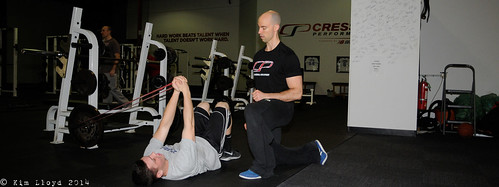Ask ten different people their opinion on what traits or characteristics make for a great or “successful” coach – in this case strength coach, personal trainer – and you’re bound to get ten different answers and iterations.

5 Traits of a “Successful” Coach
Some people will use adjectives like strong, looks the part, experienced, knowledgable, professional, motivating, or “destroy the back of my pants scary.”
Others will use less germane markers such as bald, has an epic beard, or sleeps with a copy of SuperTraining underneath his or her’s pillow at night.
All are important (some more so than others) and all can be used to describe many strength coaches – or any kind of coach for that matter.
It should go without saying, but this is not an exhaustive list.
Today, though, I’d like to cover some less obvious characteristics I feel constitutes a great strength coach and/or personal trainer. Some are based off of my own personal experiences, while others fall into the camp of “it’s true because it’s my blog, and because I said so.”
1. Coaches Coach

Seems like an obvious point to start with, right? But it amazes me how many “coaches” out there don’t train anybody.
Like, ever.
Such is the paradox of this technological age we live in. The internet has made everyone into an expert or authority all because 1) they say so and/or 2) because # of followers = the pantheon of expertise.
Listen, having thousands of followers on Twitter or Instagram is impressive. Anytime you have that many people interested in what you have to say, you’re obviously doing something right.
But don’t call yourself a coach or “expert” if you’re not actually coaching people.
And this is where things get little murky and where the weeds get a little higher.
This isn’t to disrespect or devalue those who make a living online. I get it. We live in the 21st century and if nothing else, the pandemic taught us that we should be ready, willing, and able to pivot to the online space when needed.
I have many friends and colleagues who do really well for themselves coaching people in a distance based fashion:
- They’re able to help more people this way.
- They get people results.
- I can’t bemoan that.
I do it too.
However, I also still spend 15-20 hours per week in my studio coaching athletes and clients in person. That’s still very important to me. It keeps me fresh and in touch with my coaching skills. And I can guarantee many coaches online who are crushing it were FIRST doing so with in-person coaching. If you can’t coach a deadlift in person, the likelihood you’ll be able to do so over a WiFI connection with someone hundreds of miles away is pretty slim.
Moreover, if I’m going to sit here and write blog posts and articles about how to train people, I better be practicing what I preach.
But that’s just me, I can’t speak for everyone.
That’s a degree of integrity I am not willing to give up.
2. Embrace Your Coaching Style
I always gain of sense of entertainment when other coaches come to observe me coaching. I think many are surprised to recognize that I’m fairly tame in my approach.
Sure, I’ll get animated, crank up the music, and pump people up when it’s needed and warranted. But for the most part I’m about as laid back as it gets. What can I say…
…it’s my inner-introvert living it’s best life.
To be clear: No one – coaches, pirates, airplane pilots, Orcs – is 100% introverted or extroverted. We’re all a mix-n-match of the two. What I find unfortunate is that it’s the more introverted side of the spectrum that tends to get society’s consternation.
Introversion is often seen as aloofness or worse, a weakness. When all it really means is that some people are mentally drained in more social environments and need a little more kitty cuddles “me time” to re-charge.
As such, those who are more introverted are often forced to be something they’re not…much to the detriment of their comfort level, happiness, and ability to not toss their face into a brick wall.
Extroversion – while having its own set of advantages and disadvantages – is seen as a strength and preferred trait in our society.
We introverts have a ton to offer as coaches – we tend to be better listeners and are more patient as an example. I’d encourage anyone who falls into this camp to embrace their introversion, understand that compromises are going to have to be made of course (read my article linked above), and that preferring to hang out with a book on a Friday night is total boss status.
3. Pull Coaching vs. Push Coaching
It’s been pointed on many occasions in recent years – especially by the likes of Nick Winkelman and Brett Bartholomew – the power of using EXTERNAL (as opposed to using internal) cues when coaching – particularly when working with beginner or intermediate level lifters.
To Summarize:
Internal Cues = Specific bodily actions or what it’s doing in space.
External Cues = Intent, distance, or an action.
Exercise Internal Cue External Cue
1. Deadlift “Chest up.” “Show me the logo on your shirt.”
2. Squat “Knees out.” “Spread the floor.”
3. Bench Press “Arch your back.” “Meet the bar halfway.”
4. Sprinting “Extend your hip.” “Push the ground away.”
External cuing tends to have more “sticking” power and resonates more with most lifters. Nick Tumminello has a nice way of putting it:
“Speak client, not trainer”
Taking things a step further, I really love the idea of “Pull” coaching vs. “Push” coaching – a concept I stole from my good friend and colleague Tony Bonvechio.
Pull Coaching = Helping someone solve their own problems…listening to understand, asking questions, paraphrasing, suggesting options.
Push Coaching = Solving someone’s problems for them…telling, instructing, giving advice.
Both scenarios have efficacy and have their time and place. However, I’d argue we need more of the former compared to the latter. As a coach I want to EDUCATE my athletes and clients to be their own best asset; to figure shit out if I am not there. I don’t want them to have to rely on me for everything.
Like:
- When to add weight to any given exercise.
- When to temper their workouts and when to push themselves further.
- How to make simple exercise substitutions if equipment availability is an issue.
- To understand why burpees (and kipping pull-ups) are straight up dumb.
- And, do I really need to remind you to g0 Watch Beef on Netflix? FOR THE LOVE OF GOD!!!!

You know, the important stuff.
I think far too many coaches and personal trainers push at the expense of pull. Strive to empower your clients by making them more competent and encourage more autonomy (making their own choices).
4. Insatiable Desire to Get Better
Dan John sits in the front row whenever he attends a workshop or seminar. Mike Boyle still attends numerous events every year and is never afraid to backtrack or admit when he’s wrong. Ali Gilbert is the same. Eric Cressey just bragged the other day he’s listened to 25 books on Audible this year.
On 2x speed (the psychopath).
All of them have decades of coaching experience, and all are still striving to get better.
Who in the holy f**k are you?
You’ve got it all figured out huh? No need to continue to learn from others, right? It’s YOUR way or the highway? Everyone else is a moron? Got it.
A-hole.
5. Lets Stop With the “Grinding” and “Hustling”
While it’s a bit more toned down now, I’m so sick of seeing stuff like this.
We see them on social media all the time.
The “Grinders.”
The ones who are soooooo busy and soooooo swamped and have sooooooo much more of a work ethic than everyone else.
Listen, I can appreciate people with work ethic. And I’ll be the first one to champion hard work and the notion that nothing happens without some degree of sacrifice, uncomfortableness, and inconvenience. And yes, long-ass hours.
But please, spare us the inspirational quotes and grandstanding because you happened to get up before 5 AM two days in a row or, I don’t know, haven’t eaten a carb since March.
Grinding is four tours of duty in Iraq and Afghanistan. Grinding is raising a child as a single parent. Grinding is going through intensive chemotherapy and still putting a smile on your face. Grinding is listening to your co-worker brag about their CrossFit workouts and attempting to keep your eyes from rolling out of their sockets every time (s)he waxes poetic about how you’re going to die tomorrow for drinking a Diet Coke.
It has nothing to do with how superior you are because you avoid seed oils or because you train eight clients per day, six days per week.
Speaking of which:
To the “rise and grinders”…I love the work ethic, but there’s only a finite # of hours per week you’re an affective coach.
You’re not the same coach at the end of the day as you are at the start. You’re not the same coach at the start of a week as you are at the end. Touting the early wake-up times and hustle mentality isn’t the long-term flex you think it is.
It’s not a coincidence most trainers/coaches putter out after two years. They inevitably hate life.
I understand bills need to be paid, and I want to reiterate that I also understand there will be a window of time where long hours are going to happen. But be cognizant that there are only a finite number of hours where you’re an affective coach and where you’ll inevitably burn out.
There’s is a healthy balance and I hope you can find it.




 just counting reps and throwing some exercises together and calling it a program. It’s training people with an intent to make an impact on their lives.
just counting reps and throwing some exercises together and calling it a program. It’s training people with an intent to make an impact on their lives. Good coaching looks a bit like good parenting. It’s a combination of everything from teaching and motivation to providing boundaries and developing habits…all with a focus on helping the client become a better version of themselves and ultimately achieve their potential. So, coaching is no one thing…it’s a combination of many things.
Good coaching looks a bit like good parenting. It’s a combination of everything from teaching and motivation to providing boundaries and developing habits…all with a focus on helping the client become a better version of themselves and ultimately achieve their potential. So, coaching is no one thing…it’s a combination of many things. nutritional counselling are just a small part of a successful coach-client relationship – “Good Coaching” also considers client education, appreciates the value of effective communication and looks to empower the client in as many ways as possible.
nutritional counselling are just a small part of a successful coach-client relationship – “Good Coaching” also considers client education, appreciates the value of effective communication and looks to empower the client in as many ways as possible. Coaching is about communication of your knowledge of the X’s and O’s of training and programming. So, “good coaching” looks like a good relationship between the trainer and the people they’re currently working with.
Coaching is about communication of your knowledge of the X’s and O’s of training and programming. So, “good coaching” looks like a good relationship between the trainer and the people they’re currently working with.

